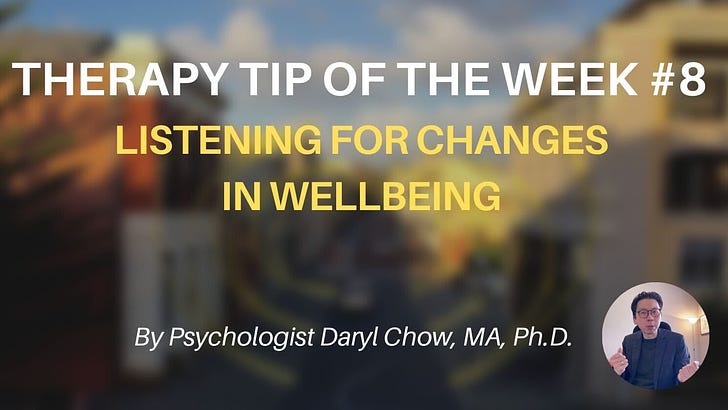Frontiers Friday 109: Alliance (Part VI) ⭕️
One new therapy tip video, and 3 latest psychotherapy research on alliance and its impact on outcome.
Is it possible that client related factors like the age, symptoms and baseline wellbeing influences the alliance-outcome relationship?
I come from a gambling heritage, so I invite you to place your bets before you read on... (Just so you know, based on the studies mentioned below, I didn’t exactly win this bet).
Ok. Read on.
📽 New Video from Frontiers, Therapy Tip of The Week #8, Listening for Changes in Wellbeing
Don't be seduced by an approach of starting every session with "What's gotten better since the last session?"
First, find out if things have gotten better. If things are still stuck in a rut, it would come across as unsympathetic and ignorant to be sticking to the formula of being "strength-based."In this week's tip, I'd talk about how we can specifically listen for changes between sessions, and why measuring a person's wellbeing matters more than a symptom-specific measure.
📜Research: The reciprocal relationship between alliance and early treatment symptoms: A two-stage individual participant data meta-analysis
A recent meta-analysis trying to sort out if alliance leads to improvement or improvement leads to better alliance.
Key Grafs:Early alliance predicted post-treatment outcome.
"...in the early phase of therapy, symptoms and alliance were reciprocally related to one other, often resulting in a positive upward spiral of higher alliance/lower symptoms that predicted higher alliances/lower symptoms in the subsequent sessions early in therapy."
📜Research: Assessing the Alliance–Outcome Association Adjusted for Patient Characteristics and Treatment Processes": A Meta-Analytic Summary of Direct Comparisons
Another meta-analysis.
This time the question is related to how much of client's characteristics at intake, as well as therapist' adherence and competence affects the alliance.
Key Grafs:This study found that alliance-outcome association is an "independent process-based factor," i.e., above and beyond client factors at intake.
Based on the Supplementary Materials, it appears that there is a wide-range of variables consisting of "Intake factors" e..g., gender, age, symptoms and wellbeing measures at baseline.
This was also the first meta-analysis to examine the effects of adherence and competence on the alliance-outcome association, which was found not to be a predictive factor.
This seemed to be contradictory to a study I mentioned in FF106 on socioeconomic status and working alliance. Granted, this was based only on a single study. However, I could wrong. Combing through the Supplementary Material, I found that SES was not in the list. Anyway, this meta-analysis was also published a year prior.
📜Research: Within-patient perceptions of alliance and attunement
Sometimes I read research papers and I think I already know what they found. Don't be misled by the simplicity of this recent 2021 study on therapeutic relationship.
Researches from US, Canada and Israel teamed up to figure out if differences in alliance between clients or differences within client (i.e., changes in alliance over time) predicted outcome. (Make a guess what the results are before reading on.)
Key Grafs:i. "The general experience of a strong therapeutic relationship (i.e., collaborative working relationship and feeling attuned and responded to) relative to other patients did not appear to contribute to symptomatic change." In other words, the patient's average working alliance score did not predict outcome.
ii. Instead, "the patients' specific fluctuations in working alliance relative to their own general experiences appeared important for subsequent symptomatic change 1 month later." In other words, improvement in alliance scores over time predicted improvement in psychological functioning.
iii. Special note: The importance of real-time monitoring of therapeutic alliance.
The authors cited that,
"This may be particularly helpful for patients who have difficulty expressing disappointment or unhappiness with therapy or those who are overly compliant. Indeed, Samstag et al. (1998) have pointed out that patients may be reluctant to voice dissatisfaction directly to the therapist in sessions, even though the exploration of such negative feelings might be very therapeutic."
⏸ Words Worth Contemplating:
“Authenticity is the daily practice of letting go of who we think we’re supposed to be...”
~ Brene Brown, The Gifts of Imperfection.
Reflection
Forging an alliance with each and every one of our clients, as diverse as they are, day in day out, is hard stuff.
And try as we may, they are some people that we fail to connect with.
We must not push, chastise or judge our clients if they don't fit into the doctrines of our knowledge.
You are a healer, but not everyone wants your healing.
We must not push, chastise or judge ourselves to be more than we are. But we must stand at the door and invite people to the house of healing if they choose to.
For some, the conversation must begin at the doorsteps.
Meanwhile, we must continue to learn deeply, slowly and patiently. We must tend to our personal learnings less like a builder and more like a gardener. A builder builds, until it is completed.
A gardener is never done. A gardener plants some seeds under some good soil, waters it consistently, prunes and adds more... The garden is shaped into being, and continues to evolve, depending on your care of it.
Tend to the garden of your learnings.
(If you are interested in this type of gardening/learning, check out Deep Learner)
BIG HUGS TO NEW PEOPLE WHO ARE AT THEIR FRONTIER!
If you've just joined us, I'm glad you can join us at the "bleeding edge." Feel free to check out the back catalogue of Frontiers of Psychotherapists Development (FPD). You might also want to go into specific topics in the FPD Archives like
And if you want to see past newsletters, the entire archive is now made available in substack.
In case you missed it, see the most recent missives
Devotion to the Craft (6 Parts)
Caring for People in Organisations (3 Parts)
Clinical Supervision (3 Parts)
Feedback Informed Treatment (4 Parts)
Unintended Consequences (2 Parts)
Deep Learner (4 Parts)
Going Further with Deep Learner and The Use of Obsidian (6 Parts)
See What You Hear, Hear What You See (4 Parts)
Trauma (3 Parts)
Deliberate Practice (5 Parts)
Empathy (6 Parts)
Therapist Effects (2 Parts)
Client Point of View (4 Parts)
Tech Tools for Therapists (4 Parts)
Emotions (6 Parts)
Sensitivity (3 Parts)
My other blog site is called FullCircles: Reflections on Living
By the way, don't feel bad if you want to unsubscribe to this newsletter. This might not be for you. The last thing I want is to add to the anxious clutter of our inboxes.
Daryl Chow Ph.D. is the author of The First Kiss, co-author of Better Results, and The Write to Recovery, Creating Impact, and the forthcoming book The Field Guide to Better Results.
Note: These newsletter are free, many hours are spent handpicking the curated list that make it to Frontiers Friday, as well as writing the essays and recording the videos and podcasts. Amazon affiliate links, if any, are to help ease the cost of these missives.
p/s: Please excuse any typos!
pp/s: New book to be released… next week! Stay tuned.




